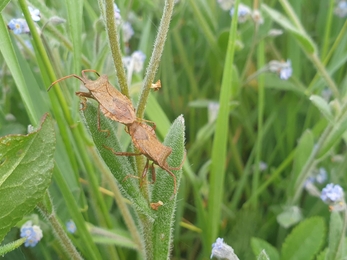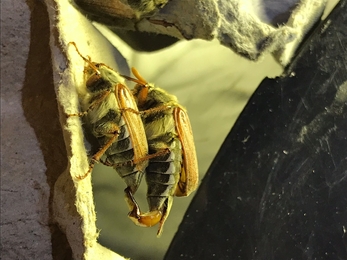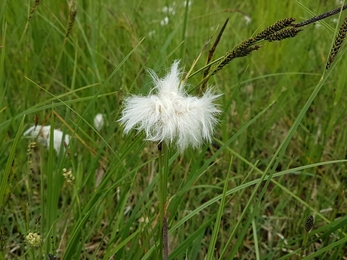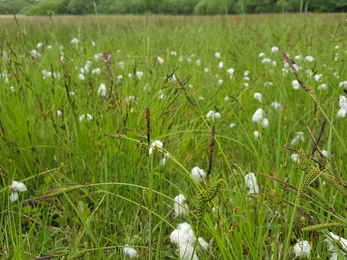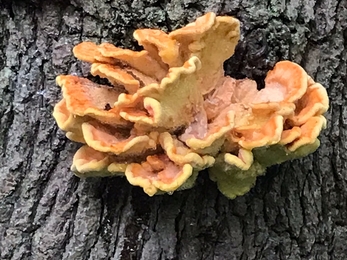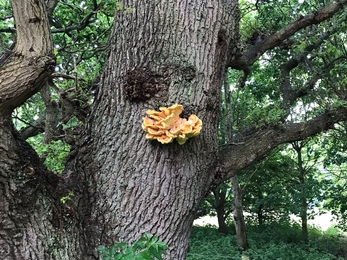Weekly wild news from our reserves - 27 May 2022
Cotton grass at Thelnetham Fen – Debs Crawford
Warden Lewis came across this newly born Chinese water deer fawn at Carlton Marshes this week. Deer leave their fawns hidden like this because the tiny deer would get exhausted following its mother as she grazes. It’s essential that dogs are kept on short leads to prevent disturbing these vulnerable fawns. If you come across a deer fawn whilst walking, please move away as soon as you can and never touch them, as this would leave your scent on them which may lead to the mother rejecting them.
Chinese water deer are easily distinguished from other deer by their cute teddy bear-like appearance and the huge canine tusks displayed by the stags. As their name suggests, these deer were introduced from China in the nineteenth century. They are strong swimmers and favour wet, marshy habitats, being seen frequently at both Carlton Marshes and Trimley Marshes.
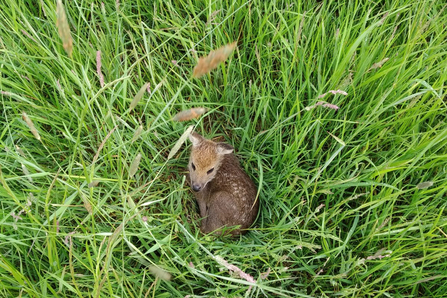
Chinese water deer fawn – Lewis Yates
Pastures new
Our British white cattle have been moved from their wintering quarters at Church Farm to Hen Reedbeds, where they will spend the next five months conservation grazing. They certainly seemed to approve of their lush new pastures!
Love is in the air!
Insects have one thing on their mind at this time of year - breeding. These dock bugs were seen mating at Hen Reedbeds, and cockchafers were also getting friendly at Lound Lakes.
Fluffy fen
There are gorgeous cotton grass displays captured by Valley Fens Assistant Warden Debs at Thelnetham Fen this week. Despite its name, common cotton-grass is a member of the sedge family, rather than being a grass. Historically, common cotton-grass was used to stuff pillows in Sussex. It was also collected and used in Scotland to dress wounds during the First World War.
Yellow flags
Warden Jamie and his trusty volunteers have been improving the path surfaces at Hen Reedbeds this week. Their hard work was rewarded with stunning scenery, with bright yellow flag iris and dramatic Suffolk skies! The large, sunshine-yellow flowers of the yellow iris brighten up the margins of our ponds, wet woods, fens and marshes. Also called the 'flag iris', its outer petals have a characteristic 'droop'.
Glittering wasp
Warden Dan spotted this dazzling ruby tailed wasp at Oulton Marshes this week. If seen up close, the ruby-tailed wasp is an amazingly beautiful insect. A solitary wasp, it can be found in sandy and rocky habitats like quarries, outcrops and walls. These wasps are also known as ‘cuckoo wasps’ because they lay their eggs in other solitary bees’ nests, especially mason bees, and when the larvae hatch they eat the other bees’ larvae.
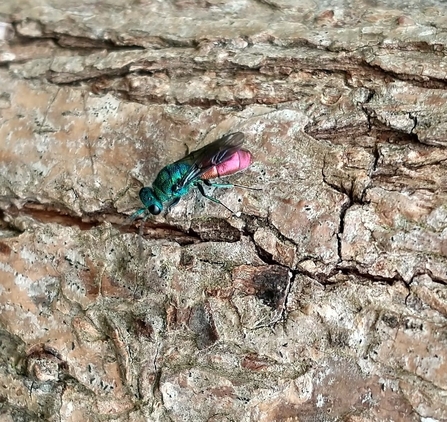
Ruby-tailed wasp at Oulton Marshes - Dan Doughty
Water violets
Several of the dykes at Carlton Marshes are looking stunning this week. They are full of water violet, an aquatic plant which flowers in early summer, producing delicate lilac flowers with yellow ‘eyes’ at their centre.
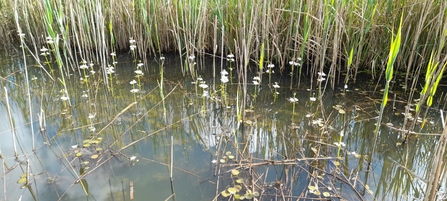
Water violets – Gavin Durrant
Hen on the oak
The chicken (or hen) of the woods is a bright yellow fungus comprising several thick, overlapping brackets. The individual brackets are soft and spongy when young and exude a yellow liquid if squeezed. They are fan-shaped with an undulating margin. The upper surface is velvety and yellow-orange with a zoned margin, while the underside is yellow and covered with pores. It can often be found in tiered clusters on oak, like this one at Lound Lakes, but also grows on beech, chestnut, cherry and even yew.
Rotten posts
Lound Lakes Warden Andy and his team did a great job replacing rotten fence posts and added new gates on new posts and old gates on new posts. Andy cleverly repurposed this fly-tipped patio table to create secure bolts for the gates! These gates will ensure the cattle are kept securely and prevent visitors from straying into the grazed areas.
Bowled over
Assistant warden Frances found this discarded bowling ball whilst completing bird surveys at Carlton Marshes this week. This unusual find highlights the problem of plastic and other waste which often ends up on reserves and in waterways.
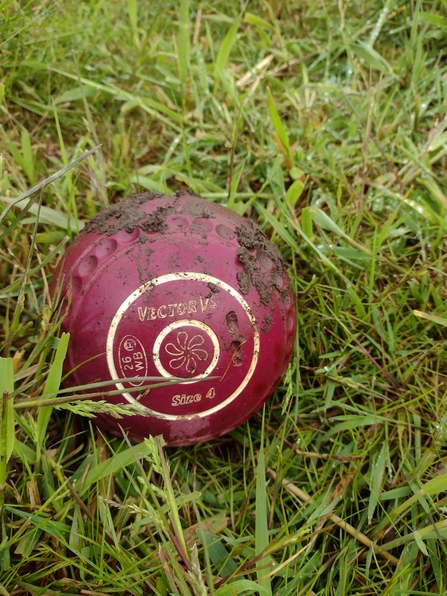
Bowling ball- Frances Lear


